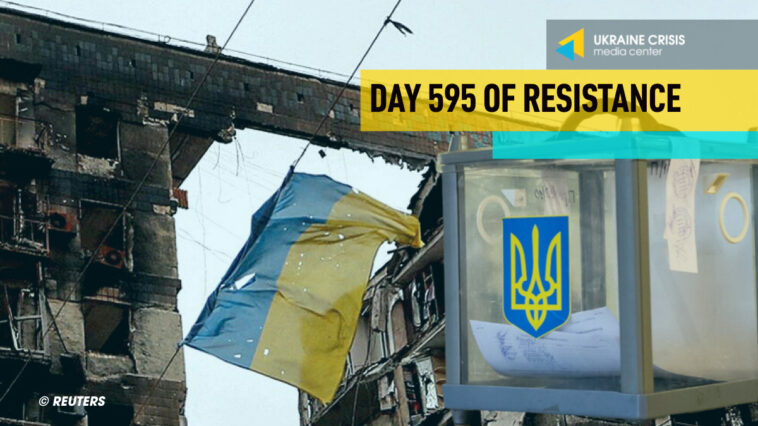Russian forces attempt to go on the offensive in several sections on the front lines near Avdiyivka. The U.S. announces a new USD 200 million aid package for Ukraine. Sixty-four per cent of Ukrainians are against holding elections in war, a survey finds.
Russia attempts to go on offensive in several sections on front lines near Avdiyivka
Russian forces launched localized offensive operations in the Avdiivka area of Donetsk Oblast and southwest of Orikhiv in western Zaporizhia Oblast on October 9, which are likely intended to fix Ukrainian forces away from the Robotyne area [where Ukrainian troops advance – edit.], the Institute for the Study of War (ISW) said in a report on October 10. Russian forces intensified offensive operations northwest of Avdiivka near Ocheretyne, Tonenke, and Berdychi and southwest of Avdiivka on the Vodyane-Opytne line. Russian forces also attacked southwest of Orikhiv on the Pyatykhatky-Zherebyanky line, and Russian milbloggers claimed that Russian forces advanced up two kilometers in the area.
The Ukrainian General Staff confirmed up to three Russian battalions conducted an attack in the Avdiivka direction, and ISW has observed footage of fighting in the area, but ISW has not observed any confirmation of these claimed Russian advances as of this writing. A Kremlin-affiliated Russian milblogger claimed that Russian forces reached the outskirts of Berdychi but denied other Russian reports that Russian forces captured the settlement. Russian milbloggers are largely portraying the Avdiivka-area operations as a significant offensive effort aimed at encircling the Ukrainian force grouping in Avdiivka and capturing the city. A successful encirclement of Avdiivka, one of the most heavily fortified areas of the Donetsk Oblast front line, would very likely require more forces than Russia has currently dedicated to the Avdiivka-Donetsk City effort. Russian forces have largely deployed irregular forces along this frontline, primarily elements of the 1st “Donetsk People’s Republic” (“DNR”) Army Corps and additional volunteer formations that have largely suffered from poor and abusive command culture and tensions with regular Russian units, the Institute for the Study of War said.
ISW has observed no recent Russian deployments to this line. Russian forces have also conducted grinding offensive operations for relatively minimal territorial gains near Avdiivka for the past year and a half of the war, and the Russian military command is likely aware that an effort to capture Avdiivka would require more and higher-quality units than those currently deployed in the area.
U.S. announces new USD 200 million aid package for Ukraine
The U.S. is sending to Ukraine a new security assistance package valued at USD 200 million, including munitions for a new air-defense system, artillery and rocket ammunition, precision aerial munitions, anti-tank weapons, and equipment to counter Russian drones. The package was announced by U.S. Secretary of Defense Lloyd Austin ahead of the 16th meeting of the Ukraine Defense Contact Group in Brussels on Wednesday.
“That puts America’s total commitment at some USD 43.9 billion since the start of Putin’s war,” Austin said.
“I look forward to hearing about the new support packages that many countries here are preparing,” he added.
The new assistance package will be backed by the funds discovered after a Pentagon accounting error over-valued billions of Ukraine aid. The error worked to Ukraine’s benefit because more equipment can be sent even as a bill to avert a government shutdown axed aid to the country.
U.S. Army Secretary Christine Wormuth earlier said Congress must pass more funding quickly for the U.S. to be able to give both Israel and Ukraine the weapons and munitions they both now need.
Sixty-four per cent of Ukrainians are against holding elections in war, survey finds
Sixty-four per cent of Ukrainians are against holding parliamentary and presidential elections during wartime, a survey conducted by the Razumkov Center finds.
Only 15 per cent say they support holding a vote in wartime, and 21 per cent reported they have not decided.
Ukrainians who support holding elections, say a vote is necessary to maintain democracy in the country (six per cent), show the world that Ukraine is a democratic nation (five per cent), change (five per cent) or refresh the leadership (five per cent). Another five per cent say a vote will open a debate on the problems facing the country and ways to address them.
Among those who oppose a vote before the war ends, 36 per cent say that the country lacks funds to hold elections, 32 per cent say Ukraine’s constitution prohibits elections under martial law, and 31 per cent say it would be a problem to create a secure environment for a vote. Also, it will not be possible to uphold the standards of a democratic vote under martial law when political rights and freedoms are limited (29 per cent), or hold elections in the temporarily occupied areas (26 per cent).
It will be difficult to organize a vote among internally displaced people, Ukrainian refugees abroad (24 per cent), and soldiers on the front lines (22.5 per cent), according to other statements.
Russian security services could meddle into the electoral process (14 per cent), and internal political conflicts could intensify, resulting in decisions grounded in populism (13 per cent), other respondents opposing a vote say.
Eleven per cent of Ukrainians say a temporary halt of martial law during the war could hurt the country’s security and defense.
Also, nine per cent say members of election commissions, observers and candidates could be called up.
If Ukraine holds elections, 15 per cent say they will vote for existing political parties, 24 per cent say they will cast their vote for new political forces, if there are any. One-in-three (31 per cent) Ukrainians say this will not be decisive for them.




